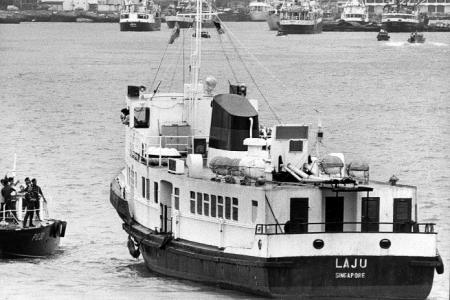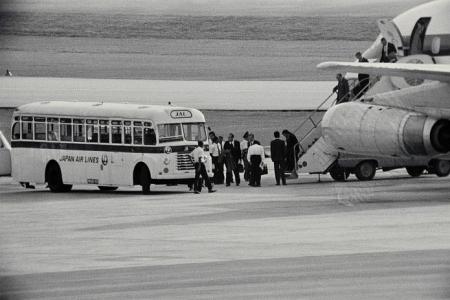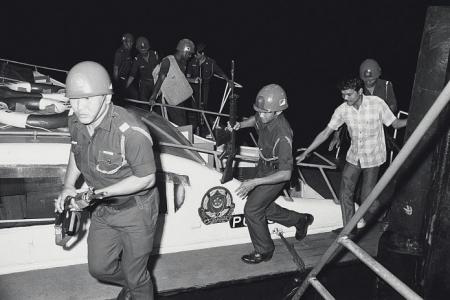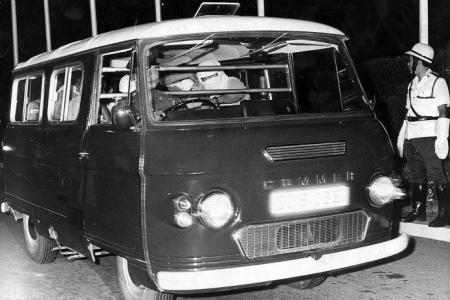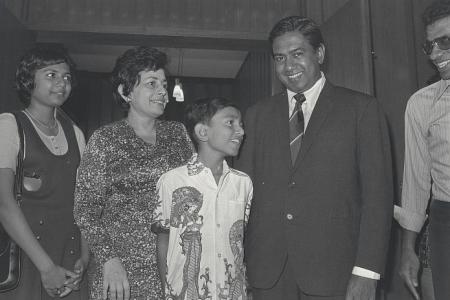Last days of the Laju hijack
The Laju hijack unfolded over nine days. MELVIN SINGH and HARIZ BAHARUDIN (tnp@sph.com.sg) zoom in on the last two days as the hijackers negotiated for safe passage out of S'pore
FEB 7, 1974
Police perform a series of practice runs on the route they are to take from the Marine Police jetty at Kallang to Paya Lebar Airport, where the Japan Airlines plane will be waiting.
Everyone is ready.
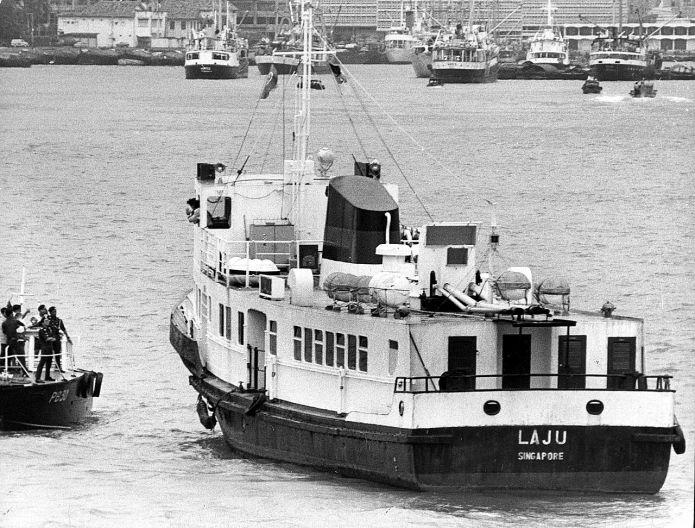
As the hijackers direct the Laju ferry to the jetty - a 30-minute journey - they keep their guns pointed at the heads of the three hostages.
Then they board a police van and are taken to the Paya Lebar Airport VIP lounge.
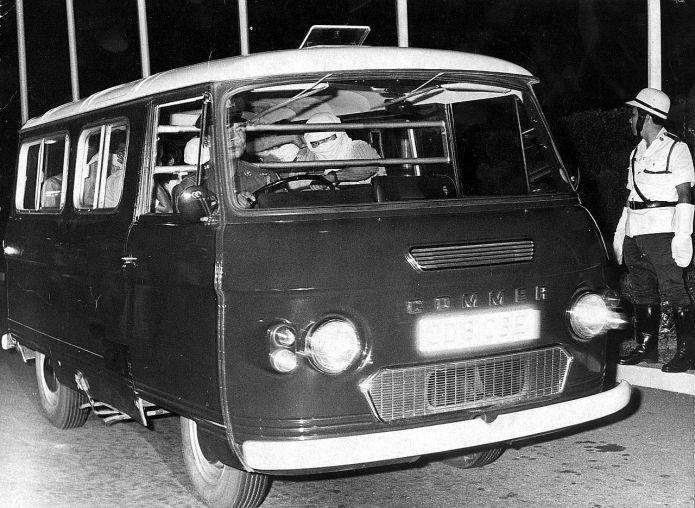
Mr Nathan relates in his book: "At the airport, Haji Abu Bakar, an Arabic-speaking official of Singapore's Syariah Court, who had been helping in the exchanges with the Arab hijackers, was asked to come with us, making the team 13 in number.
"Because of the last-minute nature of the arrangements, he did not have a passport and boarded the plane without having spoken to his family.
"This was courageous - not having a passport could have created difficulties both on landing in Kuwait and on his departure."
It is now time to surrender the weapons.
Mr Tee is with his translator in the VIP lounge and the four hijackers. He again reminds them to give up their weapons.
Mr Nathan relates what happens next: "Tee Tua Ba, seeing suspicion, fear and anger in their eyes, reminded them of the guarantee.
"He suggested if need be, they can keep one of the bullets in the leader's Browning automatic, which would be held against his temple.
"While Tee was guiding the hand holding the gun to his own head, the hijacker said that would not be necessary. Then they all surrendered their arms."
Mr Tee says he knew the airport was surrounded by armed police officers and soldiers.
"If they heard a shot fired, they would know I was dead or seriously injured and would have moved in," he tells The New Paper on Sunday.
"I told them to surrender their arms and explosives. They had trusted me so far, and we had operated in good faith.
"The plane wouldn't take off unless they did so and that was when I took his hand and guided the gun to my head.
"The Arab leader stopped me and said, 'Brother, I trust you.'"
FEB 8, 1.25AM
Just before he boards the plane, Mr Tee gets a call.
"I received a sudden call from Mr Tay Seow Wah, Permanent Secretary of Home Affairs.
"I thought something had gone wrong. To my surprise, it was not."
Mr Tay has a message from Mr Lee Kuan Yew.
"It was, 'Job well done'," adds Mr Tee.
No blood has been spilled so far.
The four men, the 13 Singapore officials and other Japanese officials and crew of the Japan Airlines plane, which had flown in from Bangkok, are ready for take-off.
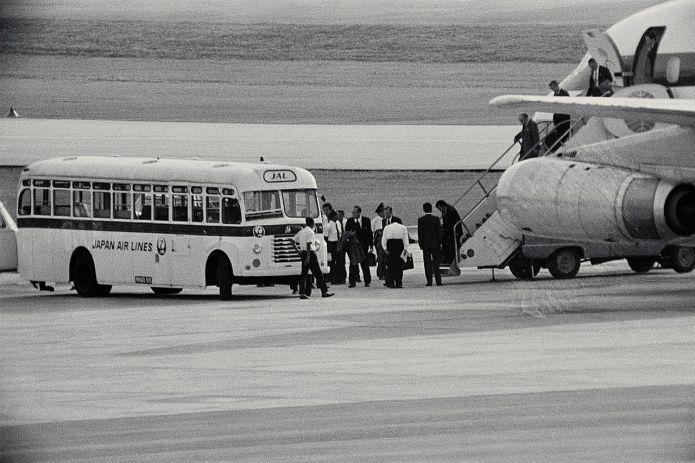
To Mr Tee, the four men are no longer hijackers. "I already totally disarmed and strip-searched all the hijackers and recovered all the weapons, which included revolvers and knives, before boarding the plane.
"The hijackers were at our mercy and in honour of our agreement, we were there to ensure their safe passage," says Mr Tee.
But the four men eye the Japanese crew and officials with some suspicion. So they are separated from one another.
The hijackers sit at the front of the plane, the Singaporeans in the middle and the Japanese at the back.
Two Singaporeans, using the surrendered guns, keep guard.
During the flight, Mr Tee continues to talk to the four men.
He says it is extraordinary that while they are adversaries, the two Japanese men and the officials are polite with one another.
Mr Nathan tells him to continue engaging the Arabs.
"They asked me why I called them terrorists.
"The Arabs said there are bigger terrorists out there and they don't know when they return home if they will disappear," says Mr Tee.
Mr Nathan joins in the conversation and tells the Japanese to take the message home to their compatriots - the Singapore Government has guaranteed their safety, and now it is their turn to return the favour for the Singapore officials.
As the flight approaches Kuwait, the control tower refuses permission for the plane to land.
Then they say it can land but nobody is to leave the plane.
Instead, the men involved in the Japanese embassy siege are to board the plane, and the flight is to leave Kuwait - destination unknown.
In his book, Mr Nathan says: "Interpreting the true facts somewhat loosely, I said I was a special envoy of the prime minister of Singapore and had a special message for the prime minister of Kuwait.
"He asked me what the message was and asked me to read it out to him over the air. I refused.
"I told him my instructions were specific and that the message had to be delivered in person directly to his prime minister."
The plane lands and is immediately surrounded by police and military vehicles.
Mr Tee describes the scene: "My god, the number of tanks and armoured personnel that surrounded us was astonishing.
"For about two hours, there was just silence."
Then the Kuwaiti defence minister walks to the door of the plane.
Mr Yoong Siew Wah bravely goes forward with Mr Nathan and Haji Abu Bakar.
Mr Nathan tells them they are guarantees to ensure the safety of the four men. It is now the job of the Kuwaiti government to protect the officials.
He tells them if anything happens to them, their prime minister has to answer for it.
The Kuwaiti officials are in deep discussion with the Japanese officials but Mr Nathan budges in repeatedly.
"Mr Nathan kept reminding them of their obligations and finally the Kuwaiti official told him, 'If you talk some more, I will arrest you,'" Mr Tee says.
The Singapore officials are told to get lost, and they do.
They decide to lie low and disperse so there is no way the Kuwaiti authorities can round all of them up and put them back on the same plane.
"We had to get lost for awhile. I gave each of our people US$100 from the funds that I had brought. We went shopping," says Mr Nathan in his book.
When asked what he bought with the money, Mr Tee laughs.
"By that time I was so tired, having had little sleep for more than a week. But this was the burden we had to endure."
FEB 8: THE RETURN
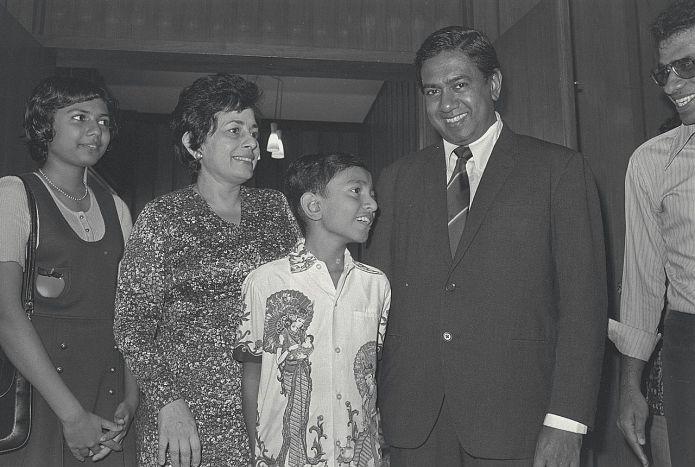
The men return home and assemble for a press conference at Paya Lebar Airport.
Their families are to wait a little longer for the reunion.
Did they think they were going to make it back alive?
Mr Tee ponders, then says: "My sons were one and two then. I thought they might not see their father again, and my wife would not see her husband.
"But we had to lead by example, and there was a job to be done. We did our job."
He says it was less dangerous on the plane than before boarding it.
But this is also the same man who directed a gun to his own temple.
The need for operation secrecy meant there was to be no great fanfare, no welcoming party.
The brave 13 were just doing their job.
*Excerpts taken from Mr S R Nathan's book - An Unexpected Journey: Path To The Presidency published by Editions Didier Miller
Get The New Paper on your phone with the free TNP app. Download from the Apple App Store or Google Play Store now

